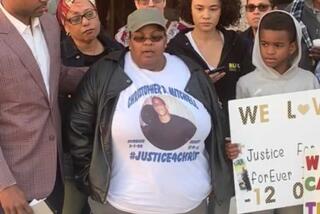Supreme Court tosses claim against S.F. police who shot mentally disabled woman
Reporting from Washington — The Supreme Court on Monday threw out an excessive-force claim against two San Francisco police officers who twice forced their way into the kitchen of a mentally ill woman and then shot her when she brandished a knife.
“The Constitution is not blind to the fact that police officers are often forced to make split-second judgments,” Justice Samuel A. Alito Jr. said.
But the court did not decide the key question raised by the case of San Francisco vs. Teresa Sheehan — whether police must take special care when arresting people who are mentally ill.
The Americans with Disabilities Act requires employers and the government to make accommodations for people with a physical or mental disability. But it is not clear whether the law extends to police officers making an arrest.
Last year, San Francisco city attorneys appealed to the high court, disputing a ruling by the U.S. 9th Circuit Court of Appeals that would have allowed a jury to decide whether two city police officers violated Sheehan’s rights when they forced their way into her room in a group home.
She has a mental disorder and loudly threatened an employee who tried to speak with her. He in turn called police to transport her to a hospital for psychiatric treatment.
When officers Katherine Holder and Kimberly Reynolds arrived and pushed their way into her room, Sheehan threatened them with a kitchen knife. They retreated and called for help. But a few minutes later, they decided to push their way back into Sheehan’s room. She charged at them, despite being pepper-sprayed. One officer shot Sheehan several times.
She survived and sued the city and the two officers.
Though the 9th Circuit would have sent the case to a jury, the Supreme Court ruled the two officers were immune from a lawsuit.
The court has held that police officers cannot be held liable for their actions unless they violate a clearly established right. In this instance, it was not clear officers did anything wrong, the court ruled. Sheehan, if left in her room, was “dangerous, recalcitrant, law-breaking and out of sight,” Alito said, so it was reasonable for officers to try to arrest her.
Separately, the justices said they would not rule on the issue of whether the disability rights law applied because San Francisco had shifted its position. Last year, the city attorneys questioned whether the law applies at all. But this year, they argued that the law applied to police in general, but not when they were dealing with an armed and violent suspect.
The court should “not reward such bait-and-switch tactics,” said Justice Antonin Scalia, joined by Justice Elena Kagan. They would have dismissed the case without a ruling.
But Alito and the majority chose to rule that officers may not be sued for using excessive force under the 4th Amendment.
That leaves open the possibility that lawyers for Sheehan could seek a jury trial on the alleged violation of the Americans with Disabilities Act.
Justice Stephen G. Breyer took no part in the decision because his younger brother, U.S. District Judge Charles Breyer, ruled for the police at the initial stage of the case.
More to Read
Sign up for Essential California
The most important California stories and recommendations in your inbox every morning.
You may occasionally receive promotional content from the Los Angeles Times.











